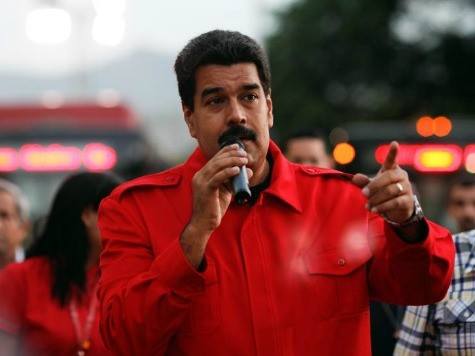
“CNN’s programming, 24 hours a day, is war programming,” the likely illegitimate Venezuelan president boomed yesterday afternoon. In a public appearance with the state’s bus drivers, Nicolás Maduro promised to “kick them out of Venezuela” for trying to “show the world that there is a civil war in Venezuela.”
According to Argentine news source Infobae, Maduro began speaking extemporaneously yesterday about the news source, telling workers that CNN only shows Venezuela “hatred.” He was in the bus terminal of Caracas, allegedly investigating damage to the transportation service done by police in their efforts to attack protesters.
“They want to show the world that in Venezuela there is a civil war, and here what the people are doing is working, studying, constructing a nation,” he told attendees. Then he turned to the network at hand: “CNN is leaving Venezuela. Enough of this war propaganda. I do not accept war propaganda against Venezuela. If they don’t fix themselves,” he concluded, “they are out of Venezuela.”
Maduro also continued to threaten would-be protesters that he would arrest anyone and everyone calling for a valid democracy in his country. “[Jailed opposition leader] Leopoldo López ordered his people to burn the streets to take down the government,” Maduro lied. “And where is he? In jail, like I said he would be,” Maduro asserted. He continued to threaten “fascists” and assure them that “there is no weak presidency here.”
This was not the first time the Venezuelan government harassed CNN for trying to cover protests. CNN reporter Karl Penhaul had his camera removed from him and his crew held at gunpoint earlier this week. Penhaul and the CNN team were in Caracas to cover the protests and speak to those close to López, who currently remains in jail, and to interview his wife, Lilian Tintori.
CNN has been significantly less successful at finding the worst of the abuses of the Venezuelan regime than the average citizen with an iPhone, however. Chavista Venezuela has a long history of oppressing official media–as Venezuelan news sources have been barred from covering the protests–but has had a much more difficult time suppressing the use of social media to disseminate images of the government’s abuses. On Wednesday night, YouTube hosted multiple civilian-made videos of the state’s National Guard tossing tear gas canisters into residential buildings where suspected protesters live and, on some occasions, shooting unarmed protesters in the streets.

COMMENTS
Please let us know if you're having issues with commenting.